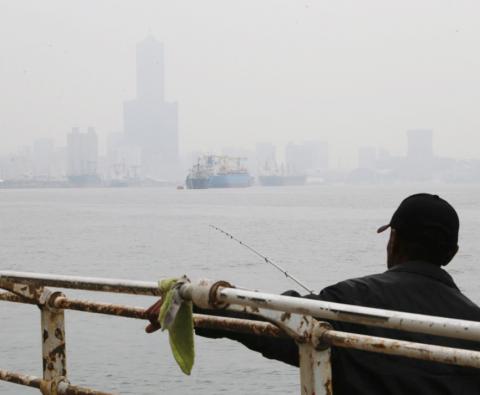Kaohsiung is launching a three-month free public transportation program today to combat the heavy air pollution that often plagues the city at this time of year.
Kaohsiung Mayor Chen Chu (陳菊) at a news conference on Tuesday announced that public transportation will be free for all electronic ticket users.
The program, proposed by the Kaohsiung Environmental Protection Bureau, allows users of electronic tickets, such as iPASS or EasyCard, to take city buses, intercity buses and light-rail trains for free, Chen said.

Photo: CNA
Electronic ticket users can ride the Kaohsiung Mass Rapid Transit (KMRT) system for free on weekdays from 6:30am to 8:30am and from 4:30pm to 6:30pm, she said.
Air pollution in Kaohsiung is particularly severe from December to February, Chen said, adding that the city government has been trying to address the problem by encouraging people to use public transportation.
Bureau Director Tsai Meng-yu (蔡孟裕) said the program is the first of its kind in Taiwan and would cost about NT$200 million (US$6.66 million).
The program could increase ridership on city buses by 1.76 million users, on intercity buses by 70,000 and on the KMRT by 1.6 million, Tsai said, adding that it is projected to reduce carbon dioxide emissions by 16,000 tonnes.
City officials yesterday said that 65 percent of the city’s air pollution comes from overseas, with factories (38 percent), construction sites (24 percent) and vehicles (38 percent) accounting for the remaining 35 percent of pollution that is produced locally.
The bureau said it has managed to control all sources of pollution except vehicles, which is why it was introducing the free public transportation program.
In related news, poor air quality in southern Taiwan is expected to continue into the weekend, the Environmental Protection Administration (EPA) said yesterday, urging sensitive groups to avoid outdoor activities as a precaution.
As of noon yesterday, air quality in the north, particularly in Taoyuan, Hsinchu County and Miaoli County and central Taiwan, had improved significantly from Wednesday, when most of the nation was subject to high levels of PM2.5 — airborne particles measuring 2.5 micrometers or less — the EPA’s Taiwan Air Quality Monitoring Network showed.
The Air Quality Index (AQI) was green (good air quality) or yellow (fair to good) in those areas.
However, the AQI remained orange at six monitoring stations in the south — including Yunlin, Chiayi and Pingtung counties, as well as Tainan and Kaohsiung — meaning that the air quality in those areas remains unhealthy.
A red index was recorded at 12 monitoring stations in those areas, indicating that the poor air quality poses a threat to sensitive groups such as children, seniors and people with heart, respiratory and cardiovascular ailments.
With the red index expected to remain for Kaohsiung and Pingtung until tomorrow, the EPA advised residents in those areas to minimize physical activities if they experience eye irritation, coughing or a sore throat, or to wear a mask when outdoors.
The EPA’s AQI takes into account ozone, PM2.5 and PM10 particulates, carbon monoxide, sulfur dioxide and nitric oxide concentrations in the air.
Additional reporting by Ko Yu-hao

Alain Robert, known as the "French Spider-Man," praised Alex Honnold as exceptionally well-prepared after the US climber completed a free solo ascent of Taipei 101 yesterday. Robert said Honnold's ascent of the 508m-tall skyscraper in just more than one-and-a-half hours without using safety ropes or equipment was a remarkable achievement. "This is my life," he said in an interview conducted in French, adding that he liked the feeling of being "on the edge of danger." The 63-year-old Frenchman climbed Taipei 101 using ropes in December 2004, taking about four hours to reach the top. On a one-to-10 scale of difficulty, Robert said Taipei 101

A preclearance service to facilitate entry for people traveling to select airports in Japan would be available from Thursday next week to Feb. 25 at Taiwan Taoyuan International Airport, Taoyuan International Airport Corp (TIAC) said on Tuesday. The service was first made available to Taiwanese travelers throughout the winter vacation of 2024 and during the Lunar New Year holiday. In addition to flights to the Japanese cities of Hakodate, Asahikawa, Akita, Sendai, Niigata, Okayama, Takamatsu, Kumamoto and Kagoshima, the service would be available to travelers to Kobe and Oita. The service can be accessed by passengers of 15 flight routes operated by

Taiwanese and US defense groups are collaborating to introduce deployable, semi-autonomous manufacturing systems for drones and components in a boost to the nation’s supply chain resilience. Taiwan’s G-Tech Optroelectronics Corp subsidiary GTOC and the US’ Aerkomm Inc on Friday announced an agreement with fellow US-based Firestorm Lab to adopt the latter’s xCell, a technology featuring 3D printers fitted in 6.1m container units. The systems enable aerial platforms and parts to be produced in high volumes from dispersed nodes capable of rapid redeployment, to minimize the risk of enemy strikes and to meet field requirements, they said. Firestorm chief technology officer Ian Muceus said

MORE FALL: An investigation into one of Xi’s key cronies, part of a broader ‘anti-corruption’ drive, indicates that he might have a deep distrust in the military, an expert said China’s latest military purge underscores systemic risks in its shift from collective leadership to sole rule under Chinese President Xi Jinping (習近平), and could disrupt its chain of command and military capabilities, a national security official said yesterday. If decisionmaking within the Chinese Communist Party has become “irrational” under one-man rule, the Taiwan Strait and the regional situation must be approached with extreme caution, given unforeseen risks, they added. The anonymous official made the remarks as China’s Central Military Commission Vice Chairman Zhang Youxia (張又俠) and Joint Staff Department Chief of Staff Liu Zhenli (劉振立) were reportedly being investigated for suspected “serious